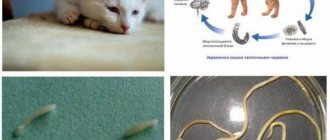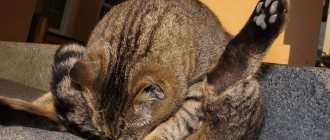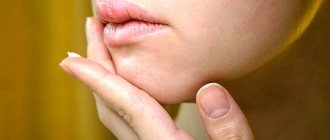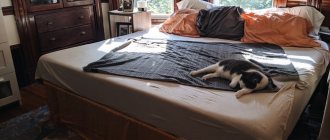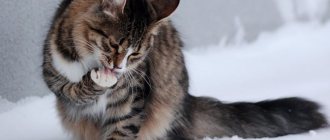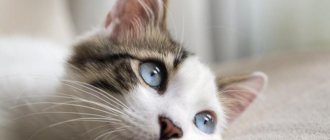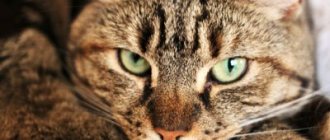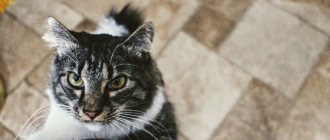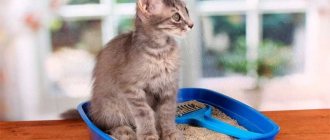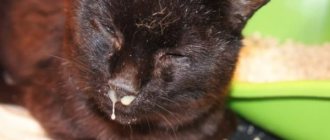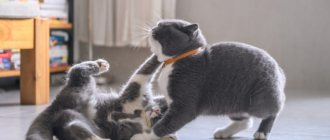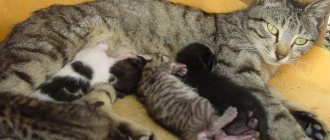Cats, like their owners, fart, although it happens less often. Flatulence is a normal phenomenon, but not for animals. Do cats fart just like that - yes, but if the pet is “carried away”, it is worth studying the problem from a medical point of view. Excessive gas and farting may indicate health problems.
Flatulence is a consequence of digestion of food. Gases are formed in the intestines and only then come out. The formation of gases is a normal process. When your pet, be it a cat or a dog, farts too often, a visit to the veterinarian is a good idea.
© shutterstock
Carbohydrates contribute to gas formation in the stomach and farting. Dogs will need a large amount of components, but cats will not. The cat’s body independently forms the optimal volume of carbohydrate mass, which is quite enough for normal life. Therefore, a healthy cat diet consists mainly of protein foods, amino acids and fats.
You can make sure whether cats pass gas during a sudden menu change. This is a serious change for a cat’s body, which negatively affects the stomach and intestines. When artificial dry and liquid food is replaced by natural food, you can hear rumbling in the stomach. This indicates intense gas formation.
The accumulation of gases leads to belching or flatulence, causing the pet to fart. Hiccups are less common. If belching is relatively safe, then flatulence is fraught with problems. Gases distort the abdominal wall and contribute to vomiting, diarrhea and cramps. All this is dangerous for a cat.
The situation gets worse with repeated meals. The digestion process is disrupted, food is not processed, gets stuck in the intestines and rots. This leads to intoxication and severe poisoning, farting. If your cat's fart smells rotten, there's something wrong with your intestines.
Table scraps and expired food
Table scraps can cause gas formation.
It is important to remember that different foods are prepared for people and animals. Therefore, cats should not be fed “human” food.
They contain spices, fat, and salt, which disrupt the functioning of the pet’s gastrointestinal tract. As a result, indigestion and flatulence appear.
The prohibition rule also applies to products that have expired. They disrupt the normal intestinal microflora, activate fermentation processes, fecal obstruction, and increased gas formation.
If it is not clear what product causes flatulence, and the cat begins to fart, then you can find out by eliminating certain foods. Once unsuitable food is identified, it is removed from the menu.
The structure of the digestive system
The digestive system of cats consists of the oral cavity, pharynx, stomach, small and large intestines. The pancreas, duodenum and gallbladder also take part in the digestion process.
An adult cat has 30 teeth in its mouth. The tongue is covered with small, rough papillae, thanks to which the cat can lap up all sorts of liquids. Thanks to saliva, the digestion process begins in the oral cavity. Next, the cat pushes food into the esophagus, which can stretch if necessary.
The food then enters the stomach, where it is digested with the help of gastric juice. From the stomach, food enters the small intestine, where it is finally digested with the help of a pancreatic enzyme.
Causes, symptoms and diagnosis
Having noticed that flatulence constantly bothers your cat, you should not go to extremes, come up with terrible diagnoses, and even less self-medicate. Let’s immediately say that flatulence can occur for hundreds of reasons; we will give the most common ones. So, increased gas production can be associated with a number of ailments or abnormalities in the body’s functioning:
- Constipation - a cat cannot empty its intestines in a timely manner for some reason.
- Allergies or individual intolerances – cats may be intolerant to certain substances, such as milk sugar or gluten. Against the background of immunity, a four-legged animal can happily consume harmful foods, and then suffer from gases.
- The inability of the intestines to properly digest food can be due to a number of reasons, from paresis and insufficient peristalsis to metabolic disorders. Such a problem can only be identified by long-term monitoring of the condition of the cat.
- Dysbacteriosis is a condition caused by an insufficient number of beneficial bacteria in the intestines of an animal. Friendly microorganisms may be destroyed by antibiotic treatment or replaced by other microorganisms.
- Intestinal inflammation is infectious or bacterial - typical signs: diarrhea, vomiting, frequent belching, bad breath.
- Intestinal viruses, such as parvovirus.
- New growths in the intestines, including benign ones.
- Other diseases of the gastrointestinal tract.
In addition to illness, flatulence can be associated with aspects of care. After analyzing the points below, you will understand why a cat farts:
A diet high in carbohydrates - the cat’s menu should contain fast carbohydrates, but according to generally accepted rules, no more than 13-20% of the total food (for adult cats).
Incorrect body position while eating food or water - when the bowl is low and uncomfortable and the cat has to take an unnatural position while eating, this leads to swallowing air. A similar situation occurs if the bowl slides on the floor while eating. A small amount of swallowed air is released in the form of belching. If a cat constantly swallows air, this leads to poor digestion and the development of severe flatulence.
The volume of accumulated gases is a very individual indicator. In some cats, flatulence is almost unnoticeable (gases pass for up to 2 hours), while for others it brings noticeable inconvenience: vomiting, diarrhea, severe gurgling in the intestines and, as a result, cramps. It has been established that the main factor in the development of flatulence is swallowing air, followed by swallowing food too quickly.
If everything is fine with your diet and you are sure of it, you need to go to the clinic and conduct a series of examinations:
- Examination of the cat and palpation of the peritoneum.
- Complete blood test, including kidney and liver parameters.
- Urine and stool analysis.
- Ultrasound and, if necessary, X-ray examination of the abdominal cavity with contrast.
Before contacting the clinic, we recommend that you take a detailed history of the animal. Try to write down in detail everything related to the daily routine, diet, activity and characteristics of caring for your pet. Long-haired cats may suffer from hair clumping in the stomach, if you did not give your ward any preventive medications, this should be indicated in the anamnesis.
Bloating in a cat due to flatulence
So that you have no doubt that your cat really has flatulence and not some other disease, we suggest that you familiarize yourself with the characteristic symptoms of this disorder
So, the cat behaves restlessly, meows pitifully and tries to attract your attention, or, on the contrary, hides in a dark corner and sits there, showing no signs of life
Bacterial Overgrowth Syndrome – SIBO
Bacterial overgrowth syndrome, or SIBO, is an excess of microorganisms living in the small intestine, leading to poor absorption of certain substances. It is not so rare, and most often in women, older people and those with digestive problems. SIBO occurs when bacteria from other parts of the digestive tract enter the small intestine, or simply overgrow in the small intestine. It can be caused by a malfunction of this organ, a weakened immune system, insufficient stomach acid, taking antibiotics, drinking alcohol, or too slow digestion. The syndrome results in abdominal pain and bloating, diarrhea or constipation, nausea, weight loss, and, of course, excessive intestinal gas.
In this situation, you cannot do without the help of a doctor - he is needed, at a minimum, in order to correctly diagnose and find out the reason causing such problems. It is not always possible to cope with bacterial overgrowth syndrome, especially when it comes to age-related changes.
Do cats fart and why?
First of all, all cats fart. This is a natural process in the animal's body. Only isolated cases without odor are the norm
If the passage of gas occurs too often, and it also smells bad, then you should pay attention to this. Flatulence or the accumulation of gases in the intestines occurs as a result of food rotting, which is caused by indigestible foods
Such products are inherent in both ready-made feeds and natural foods.
These include:
- Milk and dairy products in large quantities. Therefore, when you are preparing your pet’s weekly diet, make sure that your cat eats these foods no more than two or three times a week. It is a mistake to think that your cat farts not because today you gave him milk, and yesterday cottage cheese, and before that sour cream. The variety of dairy products has nothing to do with it, the main thing is to observe the measure (no more than 3);
- Soy, corn and wheat, which only irritate the cat’s stomach and cause fermentation, but are actively used by many food manufacturers as a source of protein;
- Garlic is simply a taboo, no matter how much they assure you that it is an excellent anthelmintic. In cats, garlic can not only cause serious stomach problems, but also harm their health;
- Fat trimmings can also be the reason why your cat farts. And this does not depend on the origin of the fat: chicken, beef or fish;
- Bread yeast. Therefore, no bread, buns or other baked goods;
- And most importantly, food from the table. A ladle of soup or something else human can cause flatulence in a cat. Spoiled food is especially dangerous. It contains pathogenic bacteria, microbes and their metabolic products, many of which do not die even during heat treatment. For example, the fish smelled, and you decided to cook it for your favorite, it became a pity to throw it away. Doing this, let alone feeding it, is absolutely forbidden, reminds Koshechka.ru.
A cat farting is not a disease, often just improper feeding.
Age is also something to consider when a cat farts a lot and it all smells bad. Young kittens and old cats are at risk. In young animals, the digestive tract is not yet “hardened”, so their flatulence can be triggered by any food. As for older cats, their stomachs weaken as they age, and they may simply stop accepting foods that previously did not cause problems.
Among other things, the passage of unpleasant gases can be caused by intestinal obstruction. This is much more dangerous and scary, since the animal can die from internal bleeding. This occurs as a result of the fact that feces do not come out, accumulate, harden and can rupture the intestines, but gases come out. Therefore, you need to carefully monitor this process.
If your cat farts very often, but has stopped going to the toilet, it is better to go to the vet immediately.
Artificial sugar substitutes
Photo by Glen Carrie / Unsplash
Many processed foods, especially low-calorie and low-carb foods, can cause bloating and gas if they contain polyols, plant-based sweeteners:
| Sugar substitute | Products containing |
| sorbitol | chewing gum, some candies, desserts, ice cream, diabetic products |
| lactitol | baked goods, chocolate, confectionery, desserts, chewing gum |
| mannitol | candies, jams and jellies, puddings and powdered drink mixes, chewing gum |
| xylitol | chewable multivitamins, hard candies, sugarless gum, and some pharmaceuticals (cough syrups) |
Polyols are sugar alcohols that are not absorbed by the human body. Instead, they are fermented by bacteria in the large intestine, releasing gases in the process.
If you experience bloating or gas from time to time, it's nothing to worry about and is most likely due to what you've eaten. However, you should consult a doctor if you experience the following symptoms:
- frequent release of gases with a pungent odor;
- constant bloating and abdominal pain;
- repeated episodes of diarrhea or constipation;
- fecal incontinence;
- blood in stool;
- high fever, nausea, chills, pain in muscles and joints.
The Atlas microbiota test will help assess the level of intestinal bacterial diversity and the ability of microorganisms to break down dietary fiber. Low potential for fiber breakdown may be one of the reasons for increased gas formation and bloating when eating fiber-rich foods.
- Dr. David R. Linden, Hydrogen Sulfide Signaling in the Gastrointestinal Tract, 2014
- Umberto Volta et al., Non-celiac gluten sensitivity: questions still to be answered despite increasing awareness, 2013
- NHS, Flatulence
- Nielson T Baxter et al., Dynamics of Human Gut Microbiota and Short-Chain Fatty Acids in Response to Dietary Interventions with Three Fermentable Fibers, 2019
- Charles Coudray et al., Dietary inulin intake and age can significantly affect intestinal absorption of calcium and magnesium in rats: a stable isotope approach, 2005
- Véronique Coxam, Current Data with Inulin-Type Fructans and Calcium, Targeting Bone Health in Adults, 2007
- Masahiko Ishida et al., Glucosinolate metabolism, functionality and breeding for the improvement of Brassicaceae vegetables, 2014
- Celiaс Disease Foundation, Non-Celiac Gluten/Wheat Sensitivity
- Harvard Medical School, Relief from intestinal gas, 2013
- Dr Jaci Barrett & Lyndal McNamara, FODMAP blog, Polyols, 2016
- Harvard Medical School, Relief from intestinal gas, 2013
- Nielson T. Baxter et al., Dynamics of Human Gut Microbiota and Short-Chain Fatty Acids in Response to Dietary Interventions with Three Fermentable Fibers, 2019
- Science direct, Chicory roots
- The Washington Post, Christy Brissette, Inulin is being added to a lot of food products. And that could be bothering your stomach, 2019
- D Meyer & M Stasse-Wolthuis, The bifidogenic effect of inulin and oligofructose and its consequences for gut health, 2009
- Justin L Carlson et al., Health Effects and Sources of Prebiotic Dietary Fiber, 2018
- KG Jackson et al., The effect of the daily intake of inulin on fasting lipid, insulin and glucose concentrations in middle-aged men and women, 1999
- Younis A. Salmean, Acute fiber supplementation with inulin-type fructans curbs appetite sensations: a randomized, double-blind, placebo-controlled study, 2017
- Alanna J. Moshfegh et al., Presence of Inulin and Oligofructose in the Diets of Americans, 1999
- NHS Inform, Flatulence Causes and Treatment
- ScienceDirect, Sorbitol
- Sergio I. Martinez-Monteagudo, Maryam Enteshari, Lactitol: Production, Properties, and Applications, 2018
- Mannitol: A Sweetener? A Supplement? A Cure?, 2018
- Kris Sollid, What is xylitol, 2019
How to choose the right food?
A very common cause of flatulence is improperly selected food. Do not forget that a cat is not a person, and therefore you should not feed it from your table. The cat's food must be properly balanced and contain the required amount of vitamins and minerals. Premium species can boast of a good composition.
Cheap economy-class food most often does not contain normal meat, but includes by-products (production waste). In addition, they contain additives that are addictive.
Thus, the answer to the question “do cats fart” is clear: yes, they fart. And this is a completely normal process. However, do not forget that if a cat farts frequently, this is a good reason to consult a doctor.
A very common cause of flatulence is improperly selected food. Do not forget that a cat is not a person, and therefore you should not feed it from your table. The cat's food must be properly balanced and contain the required amount of vitamins and minerals. Premium species can boast of a good composition.
Thus, the answer to the question “do cats fart” is clear: yes, they fart. And this is a completely normal process. However, do not forget that if a cat farts frequently, this is a good reason to consult a doctor.
Veterinarian advice
Veterinarians have concluded that the most common reason cats fart is swallowing air when eating. The second most important reason is poor quality feed. Economy-segment food is now widely available on the market, and many owners feed it to their pets, thereby causing severe harm to the body. Low-quality food is especially harmful for kittens: the animal’s body is not yet formed and it is very important that it receives all the necessary nutrients and vitamins.
It is worth noting that various diseases are also a common cause of flatulence, which only a veterinarian can identify. You shouldn’t leave things to chance if you have doubts about your pet’s well-being.
At the appointment, the veterinarian must do an external examination and palpate the abdomen. The animal's blood should be taken for tests. An x-ray or ultrasound may also be needed. It is these actions that can help determine the cause of flatulence and take the necessary measures in time.
Diseases leading to flatulence
Unfortunately, the problem of frequent farting in a cat cannot always be solved by simply changing its diet. If you have serious health problems, you cannot do without treatment.
Flatulence can be caused by diseases such as inflammation and intestinal cancer, viruses and parasites in the intestines, intestinal obstruction, and pancreatic diseases.
If the cat begins to suffer from pain when touching the abdomen, bloating, loss of appetite, diarrhea and vomiting, a visit to the veterinarian should not be postponed. In addition, the owner should be alert to bloody feces and severe salivation.
The fact that a cat has serious health problems is indicated by its behavior, weakness, dullness and even hair loss, and not just flatulence and unpleasant odors. These symptoms are enough to take the animal to the veterinary clinic.
leave a comment
Comments (1)
Add a comment
The digestion process always causes the formation of gases, this happens in both animals and people, and there is nothing wrong with the fact that a cat sometimes farts. Rare emissions of gases that do not have an unpleasant odor are considered normal. However, if the animal farts too often and at the same time spoils the air, you need to think about what you are feeding it and change the menu. If the problem does not go away after this, you should contact your veterinarian.
Changing your diet
Improper feeding is one of the main sources of indigestion and gas in a cat. A lack or excess amount of food, an incorrectly selected diet, and eating waste from the master’s table provoke gastrointestinal dysfunction. Mature pets are in a subgroup at increased risk for the disease, and their weakened bodies require a sufficient supply of vitamins and minerals.
Note! Good expensive food has a high price, but does not harm animals. They are classified by age, activity level and body weight
They cannot overfeed or underfeed your furry pet.
Why are cheap options not suitable? They have added foreign components - legumes, soybeans, corn. For a carnivorous predator, they are foreign and are poorly digested in the gastrointestinal tract. Artificial flavor enhancers and other flavorings become a favorable source of proliferation of pathogenic microflora.
You cannot buy food according to your pet’s taste preferences. If earlier he avoided foods that were dangerous to health, now manufacturers manage to lull his vigilance with third-party additives
Inexpensive food is made from components that attract attention and interest the animal. The result of saving is a storm in the stomach due to active fermentation
Manufacturers of branded mixtures indicate on the packaging the constituent ingredients: proteins, a mixture of poultry, beef, rabbit and other animals, vegetable fats. They do not contain soy, corn and other components that increase the weight of the feed.
Does my cat pass gas after feeding? They can be caused by disruption of the feeding schedule. Three meals a day are allowed; the best option is morning breakfast and evening dinner. If an animal has access to food all day, overeating results in flatulence and other unpleasant symptoms.
Important! A hungry pet is not able to patiently wait for the time when a careless owner remembers his responsibilities. He starts looking for food in trash cans, on the table, and tries to escape into the street.
This behavior is not the result of curiosity, but a problem that leads to serious illness.
Hungry cats often look in the trash
Intestinal parasites
If your cat farts repeatedly, the problem may be intestinal parasites. Worms are localized in the small intestine and cause irritation of its mucous membranes and allergic reactions. A large accumulation of helminths leads to blockage of the lumen of the gastrointestinal tract and bile ducts. With parasites, a cat experiences not only increased gas formation, but also constipation.
But there are other sources of flatulence.
- Allergic reactions. Individual intolerance to certain foods causes allergy outbreaks. Pathology is associated with a variety of products, but more often it occurs due to milk sugars, gluten, and artificial components in finished feeds. Cheap varieties contain ingredients that make the animal want to eat them constantly. As a result, it suffers from gas, colic, and pain in the gastrointestinal tract.
- Viruses. Infection occurs through constant visiting of the street. Domestic animals are less likely to become ill with parvovirus compared to free-roaming animals. Average statistical data indicate that every second cat suffers from it due to contact with the outside world.
- Inflammation. The development of pathology is determined by diarrhea, bouts of vomiting, and bad breath. Severe gas formation during the inflammatory process is a secondary symptom. A sick pet requires a visit to the veterinarian and antibiotic treatment.
- Dysbacteriosis. Disturbance of the balance of normal microflora is associated with antibiotic therapy, poor nutrition and subsequent intoxication. The disease provokes disruption of the immune system and flatulence. Do small kittens fart when they have dysbacteriosis? In young animals, the disease is caused by transferring to roughage after mother's milk, from wet to dry food.
- Constipation. A prolonged delay in defecation provokes increased gas formation. An overfilled gastrointestinal tract irritates the pet, and constant discomfort leads to loin riding on the floor and meowing plaintively.
- Impaired functionality of the intestinal system. Pathological inability to process food normally is more common in cats with congenital abnormalities. Other causes of dysfunction include injuries and previous gastrointestinal diseases. Only a veterinarian can determine the source of the disorder after a full diagnostic examination.
- Air entering the stomach. Eager consumption of food leads to belching and gas formation. Increasing the frequency of feeding and reducing the size of portions quickly solves the problem.
Important! If the pet spoils the air regularly, the owner should consult a veterinarian. In some pathologies, ignoring the symptoms can cost him not only his health, but also his life
Features of the stomach
A cat's stomach is single-chamber. The inside is lined with a mucous membrane that produces gastric juice. There are two openings from the stomach: one opens into the esophagus, and the other opens into the small intestine.
The cat's stomach serves to store food and control the rate at which food enters the intestines and secretes enzymes necessary for the digestion process. Mixing and grinding of food occurs in it. With muscle movements, it directs food into the small intestine.
When food enters the stomach, its bottom relaxes to reduce intragastric pressure. The smell and taste of food causes the secretion of gastric juice. Digested food is sent to the intestines, and its undigested part remains in the stomach. The more caloric a food is, the slower it is digested.
How can you reduce or get rid of gas?
You can record what your cat eats throughout the day to find out which foods may be causing the gas. Next, you can follow these tips:
- Gradually change your diet to a low-fiber diet. Ask your veterinarian for recommendations for a smooth transition.
- Feed your cat smaller meals more often.
- Feed several cats separately to avoid competition for food.
- Keep your cat away from trash and spoiled food.
- Keep your cat active and make sure she gets regular exercise.
We invite you to familiarize yourself with Ternetia - a fish with a black skirt
Solution
If flatulence and constant release of gases occurs due to poor nutrition, first of all, you need to bring the cat’s diet back to normal, and do this not immediately, but gradually.
You need to feed your cat more often, but not in large portions. To prevent her from swallowing food too quickly, for fear of competition from other cats, give her food separately.
Keep your cat's food and water clean; anything that is stale or of poor quality must be removed immediately.
Play with your cat more to keep her active. Movement and physical activity will benefit her.
We invite you to familiarize yourself with Kvamatel for cats, description of the drug and indications for use.
Treatment of flatulence
Most often, increased gas formation is associated with errors in the cat’s diet. You need to feed her in small portions, fresh food. Correctly plan your pet’s diet or feed it with ready-made balanced food. Eliminate milk, bread and spices from your diet. Cats must receive meat, but not fat or chicken (duck) skin.
If gas formation is excessive and causes anxiety for your pet, you can give him enterosorbent in a children's dosage or simethicone preparations (Simethicone, Espumisan). And take him to the clinic for a consultation to rule out serious pathologies of the digestive system.
Treatment is carried out depending on the cause of the pathology. These can be anthelmintics, antibiotics and antimycotics. If intestinal ulcers form, surgery may be indicated. In mild cases, veterinarians prescribe drugs that regulate intestinal microflora and carminative drugs. If necessary, a gas tube can be inserted.
Owners sometimes don’t even know if a cat is farting, because unlike humans, animals do it very quietly. Flatulence in cats becomes obvious with the appearance of a foul odor.
If an unpleasant odor appears during the release of gases, the animal should be shown to a veterinarian. If the doctor diagnoses “dysbacteriosis”, then probiotics will be needed, most often Lactoferon. Together with them, you will need to help the body get rid of toxins by giving activated charcoal or Atoxil. Smecta will help eliminate irritation of the intestinal walls, and Espumisan will help reduce gas formation. Kittens can be fed with dill water.
Food allergies and intolerances to certain foods are treated with antihistamines. In severe cases, the cat will be prescribed antibiotics. If gas formation is associated with pathology of internal organs (with intestinal obstruction), surgery is performed.
Increased gas formation occurs due to errors in the cat’s diet. You need to feed your kitten fresh food in small portions. Spices, bread, and milk should be removed from the diet. It is imperative to feed your pet meat, but not chicken skin or fat.
If gas formation is frequent and causes discomfort to the animal, you need to give enterosorbent in a child's dosage or simethicone preparations (espumisan, simethicone). After this, take the cat to the veterinarian to rule out the possibility of a serious pathology of the food system.
Antibiotics, anthelmintics, or antimycotics may be prescribed as therapy. If ulcers are found in the intestines, surgery is performed. In mild cases, the specialist prescribes drugs that regulate microflora and carminatives. In some situations, a gas tube may be inserted.
Do cats know how to fart? What should you do if a kitten or an adult cat constantly produces smelly gases?
People pass gas from time to time, and this is considered normal. Gas formation occurs in the intestines of animals, as in humans.
What are the features of this process? Is it typical for cats? Can they fart? How often do you pass gas and what should it normally smell like? What can cause increased gas formation in a kitten or adult animal? Is it dangerous? What to do if your pet constantly farts?
How often do cats fart and do they smell normal?
All cats fart, but they don't do it often. The periodic passing of gas in such a pet should not bother its owner.
It's all about the special structure of the digestive system, namely the shortened gastrointestinal tract, which makes excessive gas formation impossible.
This feature allows the cat’s body to quickly absorb nutrients and remove metabolic products.
Normally, the passage of gas in representatives of this family should not be accompanied by a stench. Otherwise, we are talking about some internal problem.
Why does a kitten or an adult animal have increased gas production, and why is this dangerous?
Excessive gas formation is most often observed in kittens and older cats. This problem may be caused by the following in your pet's diet:
- Dairy products. When preparing your pet’s diet, you need to ensure that the animal consumes these foods no more than 2-3 times a week.
- Soy, corn and wheat, which irritate the four-legged pet’s stomach and cause fermentation in it. Despite this, such components are used by many feed manufacturers as a source of vegetable protein.
- Garlic and onion. These products have excellent anthelmintic properties, but they can lead to serious problems with the digestive system.
- Tomatoes.
Cabbages. Potatoes.
Fatty foods
It doesn’t matter what kind of fat it is - chicken, beef or fish, in large quantities it is contraindicated for cats.
Bakery products. The yeast contained in these products provokes fermentation.
Spoiled finished food
Many people mistakenly think that animals are able to digest absolutely any food. It's not like that at all. Poor quality food can provoke irritation of the mucous membrane of the digestive tract and even cause intoxication of the body, accompanied by excessive gas formation, diarrhea and uncontrollable vomiting.
There are other causes of flatulence in cats:
- Obesity.
- Aerophagia. Swallowing air is accompanied by the cat's hasty and greedy eating of food. During the rapid absorption of food, a lot of air enters the animal’s body, which accumulates in the digestive canal. Aerophagia in representatives of the cat family can be of a psychogenic nature. For example, some cats that have suffered severe emotional shock eat very quickly, swallowing air. If an animal is stressed, it may swallow air without even eating.
- Blockage of the stomach with hair that gets into it during licking.
- Worm infestation.
- Constipation. Difficulty with spontaneous bowel movement can be caused by various factors, such as blockage of the intestine with bezoars, ingestion of a foreign body, parasitic infection, neoplasms in the intestine, etc.
- Dysbacteriosis, characterized by an insufficient number of beneficial microorganisms in the intestines of an animal.
- Intestinal inflammation of bacterial or viral etiology.
- Tumors in the intestines.
- Intestinal viruses.
- Various gastrointestinal pathologies.
- Cardiovascular diseases.
- Diseases accompanied by impaired nasal breathing.
Despite the seeming harmlessness of this phenomenon, it is extremely dangerous for the health and life of the pet. Excessive gas formation in these animals can provoke:
- chronic bloating, which will lead to exhaustion, because the intestines will not be able to fully absorb food;
- compression of internal organs, causing disruption of local blood circulation in the affected area;
- ruptures of the stomach and intestines;
- failure of the digestive system;
- inflammation of the bladder and other diseases of the urinary system.
Main predisposing factors
Aerophagia (“eating” air) is a phenomenon observed during greedy, hasty eating of food. In this case, the animal swallows large volumes of atmospheric air, which accumulates in its digestive system.
Diets that contain inappropriately large amounts of soy and other legumes also contribute to bloating. It must be remembered that cats, unlike dogs, are much more sensitive to low-quality products - feeding spoiled food will lead to food poisoning and serious bloating.
The same area includes food allergies and food intolerances. If a cat’s body exhibits inadequate reactions to some of the components of the food, the likelihood of flatulence is very high.
In particular, you need to remember that cats are primarily carnivores, and therefore should be fed accordingly. Many cats have congenital intolerance to fiber, and therefore feeding their pets only cereals and bread is unacceptable.
Firstly, the animal’s body will not be able to obtain the required amount of nutrients from such food. Secondly, fiber is an ideal fermentation substrate, and therefore the cat will always become bloated if there is a high content of it in food.
We list other possible reasons:
- Any infectious disease. When, for example, a pathogenic strain of Escherichia coli “takes root” in the intestines, this has a serious impact on the entire normal microflora of the gastrointestinal tract. Toxins released by pathogens of infectious diseases are as harmful to them as to the entire body.
- Inflammatory bowel disease is also a very likely cause of severe flatulence. Vomiting, diarrhea, flatulence, poor appetite and weight loss are common clinical signs of inflammatory gastrointestinal pathologies.
- This happens when hair stones accumulate in the stomach. This is especially true for representatives of long-haired breeds.
- Oncological diseases such as lymphosarcoma can also cause flatulence.
- Viral and parasitic intestinal diseases are often accompanied by swelling of the digestive organs. In young animals and kittens, in particular, chronic intestinal bloating is a common consequence of parascariasis.
- Flatulence is not uncommon due to intestinal obstruction or partial patency. Gases simply have nowhere to go, which is why they accumulate in the lumen of the digestive organs. In the most severe cases, the pressure of the accumulated gases is such that they push feces ... into the stomach and esophagus. Vomiting, in which feces are released, is one of the most characteristic signs of intestinal obstruction. If it is not eliminated as soon as possible, the animal will inevitably die either from severe intoxication or from severe internal bleeding caused by an “explosion” of the intestines.
Owners often treat their pets by pouring liters of antibiotics into them. If they have at least some idea about veterinary medicine, and manage not to poison their pet with human drugs that are toxic to it, everything ends well...
Except for the complete “genocide” of beneficial microflora. As a result, the process of normal digestion is disrupted, which leads to constant bloating.
Physical exercise
The health of not only humans, but also their pets depends on physical activity. Veterinarians recommend visiting a pet store and purchasing special devices that help cats diversify their dull pastime indoors.
The climbing structure is safe; individual models can be rebuilt according to the principle of a children's construction set. It will keep your pet occupied for many hours, will increase its agility, strength, and relieve excess weight.
Toys - mice, balls, bags of catnip - will allow the animal to realize its hunting instincts. Chasing the elusive ball will arouse interest and improve the functioning of internal organs. You should not purchase toys from dubious places; toys made from toxic substances or poorly processed with sharp seams can cause serious damage to health.
Every cat should have its own toys
Important! In the absence of free material resources, you can use tennis balls, golf balls, and ping pong balls as a simulator. The owner must be able to determine the appropriate size of the device: the cat can swallow toys that are too small, or they will accidentally fall into the windpipe
Prevention of flatulence
The prevention of flatulence will be rational and timely feeding of low-volume, easily digestible feed.
You should not allow greedy eating of food. The animal should not beg for food, it should be provided regularly. The food should be fresh, with a pleasant organoleptic feel, desirable for the animal. If feeding is carried out with canned food, you should carefully study the expiration dates and storage conditions. To avoid viral enteritis, animals should be vaccinated promptly and regularly.
To prevent helminthic infestation, you need to make it a rule to give complex anthelmintics quarterly
Particular attention is paid to the prevention of viral diseases and helminthic infestations if the cat has free range and contact with other animals.
Do cats fart?
Increased gas formation occurs as a result of fermentation of food residues in the body. The deviation is caused by the formation of large gas bubbles, difficulties with moving the food bolus, intestinal colic, and an unpleasant odor when cleaning the intestines. Cats fart because the food they eat goes through a complete processing process in the gastrointestinal tract.
Confused cat who got rid of accumulated gases
How to tell if a cat is farting
With flatulence, the animal experiences rumbling sounds in the abdomen; palpation examination shows an increase in the intestinal volume, moderate pain when touched. The pet can sleep peacefully, but when the accumulated gases escape, it suddenly wakes up, jumps on its paws, and meows.
The pathology provokes the development of diarrhea and constant anxiety in the furry pet. If a cat farts, then the problem is related to the inability to fully process the food it eats. Flatulence indicates an incorrect diet or the formation of gastrointestinal diseases.
Good and bad food
The anatomical structure does not provide for increased gas formation due to the short digestive tract. This feature helps the body quickly absorb nutrients and remove metabolic products. Improper care of your pet leads to cats periodically farting.
For your information! According to statistics, young and older animals are susceptible to similar anomalies. Middle-aged cats suffer from flatulence due to the fault of their owners.
Flatulence in cats
Active formation of gases may be associated with air entering the stomach during rapid absorption of food, or with diseases of the digestive tract. The accumulation of fermentation products causes flatulence and belching, causing even a small kitten to fart.
Deformation of the intestinal walls under the influence of gases provokes attacks of vomiting, diarrhea, and cramps. The manifestations are dangerous for pets, but the situation worsens with repeated meals. Stopping the normal processes of processing the food bolus leads to its accumulation in the gastrointestinal tract and rotting. A large amount of unprocessed residues causes general intoxication of the body and a putrid odor.
General information
Flatulence is distension of the stomach or intestines from gases or atmospheric air swallowed when eating or drinking. The term flatulence is also used to refer to the passage of intestinal gases through the anus.
Even a healthy cat releases at least a liter of gases into the environment every day, but a sick animal can turn into a real “gas generator.” By the way, more than 90% of the total volume released is ordinary methane, which has no odor.
Foul-smelling discharge is a consequence of the admixture of hydrogen sulfide and other “fragrant” substances. And it’s good when the resulting excess can come out - it’s much worse when it accumulates in the intestinal cavity, since this can even lead (in especially severe cases, of course) to its rupture.
Thus, the production and excretion of intestinal gases is a completely normal, physiological phenomenon characteristic of any mammal. Even their excessive production does not always indicate some kind of disease.
In particular, flatulence can be benign and short-lived, arising as a result of eating a lot of food or eating some unusual food, to which the cat’s body simply has not had time to get used to and has not yet developed the set of enzymes necessary for its digestion (a characteristic symptom in this case is diarrhea). Flatulence can also be recurrent, chronic, and/or “diagnostic.”
Note! In the latter case, it indicates some kind of disease of the gastrointestinal tract. It is for this reason that chronic bloating should not be ignored - some kind of trouble has probably happened to your pet’s intestines.
Reasons why a cat develops gas in the intestines
The main symptom is bloating of the abdomen, which becomes very dense and painful to the touch. The animal becomes restless and refuses to eat. At the initial stages, frequent bowel movements and flatulence (the release of foul-smelling food gases) are observed. A more serious stage is characterized by constipation.
Due to the rapid progression of the disease and the severity of complications, you should not self-medicate. At the first symptoms, it is recommended to contact a veterinary clinic. If necessary, as first aid, it is most often recommended to give the pet an anesthetic drug, then administer enterosorbent orally.
It should be remembered that this disease may be a secondary symptom of other ailments. For example, dysbacteriosis or helminthic infestation
That is why it is important not only to eliminate the symptoms, but also to find out the reason that triggered their appearance.
This may seem like an unreasonable question since most people identify flatulence by smell. However, more than 90% of intestinal gases are odorless. Additional symptoms that a cat is suffering from flatulence and digestive problems are the following:
- rumbling in the stomach
- stomach ache
- bloating, abdominal distension
- vomit
- diarrhea
Signs of increased gas formation
You can hear rumbling sounds along the animal's intestines, the intestines are swollen, and sometimes moderately painful. The animal tries to avoid probing the abdomen. A cat may sleep, then suddenly jump up and even meow, with gases escaping loudly. The process of defecation may be disrupted, and diarrhea may begin. The cat becomes restless. The development of flatulence in cats is evidence that their body cannot fully digest the food they eat. This may indicate errors in the pet’s diet and the development of gastrointestinal diseases.
Cats, due to their anatomy, rarely experience flatulence. They have a short digestive tract, which facilitates the rapid absorption of nutrients and the removal of waste products from the body. However, the domestication of cats has led to the problem occurring more and more frequently. And the responsibility for this lies with the owner, who decides what, when and how their pet will eat. Most often, kittens and older animals suffer from flatulence.
Expired food
Expired feed and meat products that are “tasty for everyone” often cause flatulence in animals.
Prevention
Preventive measures should be aimed at preventing the causes of increased gas formation.
Preventive actions:
- Adjusting the diet, switching to food with less fiber.
- Gradual transfer to another type of nutrition.
- Gradual introduction of a new brand of food.
- Reducing the volume of a single portion while increasing the frequency of feeding.
- Encouraging your pet's active lifestyle.
- Eliminate competition during feeding.
- Create a quiet, isolated environment for each animal to eat.
- Switch to high-protein brands of food with a low percentage of carbohydrates.
- Keep garbage out of reach of cats.
- Self-walking ban. Controlling what your cat picks up on the street.
- Excluding foods that cause increased gas formation from the cat's diet.
- To prevent the accumulation of bezoars in the cat's intestines, regularly feed the animal malt paste.
- Follow your veterinarian's recommended deworming schedule.
What foods should not be included in a cat's diet?
Eliminate these foods from your cat's diet to prevent flatulence.
- Milk. One of the most common misconceptions about cat nutrition is that they all need to drink milk. This is wrong! Many cats are lactose intolerant. Milk intolerance in cats increases with age. Milk can cause stomach upset and excessive gas build-up in your pet's intestines.
- Dairy products. Cheeses, cottage cheese, sour cream, yogurt, kefir can cause flatulence, since the cat’s body is not able to properly process and assimilate such complex products.
- Canned fish. Canned tuna and other fish can cause serious health problems for your pet, including poisoning. Canned fish causes the smell of animal urine and feces to change to unpleasant.
- Garlic. Garlic is famous for its excellent anthelmintic effect, but it should not be given to cats in any form. Garlic can cause a number of health problems for your cat, so avoid getting it in your pet's food.
- Cereal products. Do not forget that cats are carnivores and they should eat mainly meat. A diet high in wheat, corn and soy is irritating to cats' digestive systems and is very difficult to digest.
- Fat and fatty foods. Cats should eat lean meat, not fat trimmings. Therefore, no fat in your pet’s diet, because fatty foods cause indigestion and flatulence.
- Bread and bakery products. Yeast, which is found in baked goods, is also dangerous to the health of cats. Yeast causes fermentation and excessive gas production, which distends the cat's stomach.
- Food that has expired. Avoid feeding your cats table scraps and especially stale food. What can harm your health will also harm the health of your pet.
Problems with increased gas formation in most cases can be solved by reviewing the diet and diet, as well as being careful about what the cat eats. But if gas has become a chronic problem and is causing discomfort and suffering to your animal, do not delay a visit to the veterinarian.
- https://www.thesprucepets.com/why-do-cats-fart-554763
- https://www.hillspet.com/cat-care/healthcare/do-cats-fart
- https://www.petcoach.co/cat/condition/flatulence/
Flatulence in cats - its causes and treatment
If, after analyzing the symptoms and diet of your pet, you realize that there is every reason for the development of flatulence, you should not wait until the situation becomes critical - the animal should be shown to a veterinarian for first aid. If it is not possible to show the animal to a specialist, you will have to provide first aid yourself.
So, in order to relieve spasms in the stomach and intestines, you will need to give the cat an anesthetic - traumeel, baralgin or antipyrine, the dosage depends on the animal’s body weight and its age. Afterwards, in order to remove gases, the cat will need to be given an activated carbon tablet or polysorb diluted in water. After a few hours, you will be able to give a cleansing enema.
If you prefer to use homeopathic remedies to treat your four-legged friend, you can try the drugs Nux vomica Homaccord or Engistol - they have proven themselves in the treatment of flatulence and intestinal disorders. They can be used both in the form of mixed injections and alternating them.
READ Domestic leopard: characteristics of the safari breed
Do cats have flatulence?
Your affectionate pet is curled up in your arms, by the way, in the body language of cats - this is a signal of trust and disposition towards you (find out here about other interpretations of cat body movements that will help owners better understand their pet), and you are in a similar relaxed state state, when suddenly your idyll is disturbed by an unpleasant fetid smell. Where could it come from?
This often happens when cats have flatulence, and about the reasons for this phenomenon, about foods that can cause flatulence in cats, and of course about how to treat and prevent excess accumulation of gases and their release with a terrible odor - we talk about all this Today we will talk in our new article...
What is flatulence
If we turn to veterinary and human medical reference books, for comparison, flatulence is the process of bloating in an animal as a result of the accumulation of gases in the intestines.
This can not be seen often, despite the fact that the release of gases for the body of animals is a completely natural process, but sometimes you can still observe an excessive accumulation of gases and their release with a terrible odor.
There are no age limits for such a disorder, but still, most often, flatulence is observed both in small kittens if they have a helminthic infestation, and in old animals whose metabolic processes in the body are disrupted as a result of old age - find out how a cat’s body ages and about the duration of her life.
If gas formation is frequent and causes discomfort to the animal, you need to give enterosorbent in a child's dosage or simethicone preparations (espumisan, simethicone). After this, take the cat to the veterinarian to rule out the possibility of a serious pathology of the food system.
Antibiotics, anthelmintics, or antimycotics may be prescribed as therapy. If ulcers are found in the intestines, surgery is performed. In mild cases, the specialist prescribes drugs that regulate microflora and carminatives. In some situations, a gas tube may be inserted.
